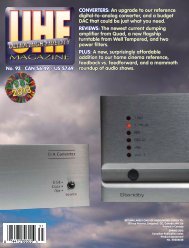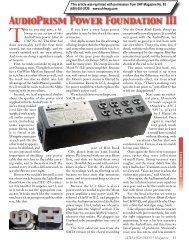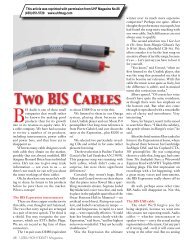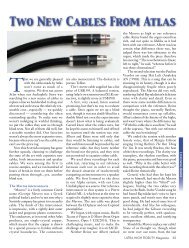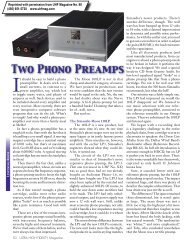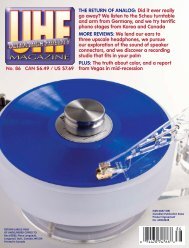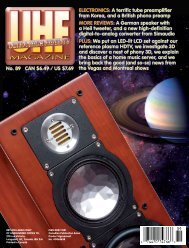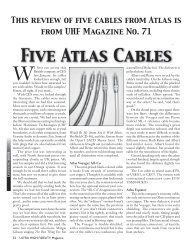ANALOG vs DIGITAL - Ultra High Fidelity Magazine
ANALOG vs DIGITAL - Ultra High Fidelity Magazine
ANALOG vs DIGITAL - Ultra High Fidelity Magazine
Create successful ePaper yourself
Turn your PDF publications into a flip-book with our unique Google optimized e-Paper software.
Case number one: a man in<br />
Feedback<br />
Features<br />
The Musical Imperative<br />
Berlin, identified only by his<br />
initials, “PM,” has suffered<br />
from an encephalitis which<br />
has destroyed the medial temporal<br />
lobes of his brain, which play a major<br />
role in memory. The result is that<br />
he has no memory at all, long term<br />
or short term. He lives only for the<br />
present instant, with no knowledge<br />
of who he is or anything that<br />
has ever happened to him. In<br />
computer terms, his personal<br />
memory bank is at 0 KB.<br />
Oh, except for one thing.<br />
If you play him a piece of music<br />
composed before his illness, he<br />
will recognize it. Indeed, he can<br />
play it on the cello, though he<br />
doesn’t remember that he was once<br />
a classical cellist.<br />
Case number two: in Saskatchewan,<br />
in the early 1960’s, a severely retarded<br />
young man fascinates psychologists.<br />
Though standard intelligence<br />
tests cannot be administered<br />
to one so handicapped, his<br />
IQ is estimated to be about<br />
35, and he cannot perform<br />
such simple tasks as tying<br />
his shoelaces.<br />
But there is a reason<br />
he becomes an object of fascination. If he<br />
hears a piece of music, he can play it by<br />
ear on the piano. Indeed, he plays quite<br />
well, though for obvious reason he has<br />
never had a piano lesson.<br />
Case number three: Dr. Tony Cicoria<br />
is an orthopedic surgeon in upstate New<br />
York. One day in 1994 he is using a pay<br />
phone, when it is struck by lightning.<br />
A bystander, who is a nurse, performs<br />
CPR and saves his life. He refuses hospitalization,<br />
and suffers only temporary<br />
memory impairment. Life goes on as<br />
before, except for one thing.<br />
Dr. Cicoria has a sudden craving<br />
for piano music. Though he had piano<br />
lessons as a boy, he has not touched the<br />
keyboard since, and he has been listening<br />
mainly to rock music, but now he is<br />
strongly attracted to the piano. He buys<br />
classical piano recordings and even sheet<br />
24 ULTRA HIGH FIDELITY <strong>Magazine</strong><br />
by Gerard Rejskind<br />
music, and becomes enamored of Vladimir<br />
Ashkenazy’s recordings of Chopin.<br />
More than that, he has the urge to play<br />
himself.<br />
And then he begins to hear music in<br />
his head, and he has a dream in which<br />
he is in a tux in a concert hall. He learns<br />
music notation and writes down his compositions.<br />
He takes lessons and learns to<br />
Only the Taliban<br />
have ever<br />
rejected music.<br />
Is your brain<br />
programmed<br />
to love it?<br />
play. Tony Cicoria debuts his first piano<br />
composition in Westport, Connecticut,<br />
on October 12, 2007, just 13 years<br />
after his literal bolt from the blue.<br />
By 2007 he is good enough to<br />
give recitals at the Sonata Adult<br />
Piano Camp, in Bennington,<br />
Vermont, where he plays the Military<br />
Polonaise and other Chopin<br />
pieces, as well as the Lightning<br />
Sonata, his own composition.<br />
The following year he debuts<br />
at the Goodrich Theater in<br />
Oneonta, New York, presented<br />
by the Catskill Conservatory<br />
in association with<br />
the State University of New York<br />
at Oneonta. The performance<br />
is assisted by a grant from the<br />
New York State Council on the<br />
Arts. The recital is recorded live by<br />
Granada Media, UK, BBC One, and<br />
German National Television. He is<br />
working on other piano pieces, as<br />
well as a symphony and a concerto.<br />
A CD of his first three<br />
works is available.<br />
What happened?<br />
The story of Dr. Cicoria<br />
is chronicled in the<br />
book Musicophilia by<br />
Oliver Sacks. Sacks<br />
was the model for the doctor in the<br />
movie Awakenings (where he is played<br />
by Robert de Niro), concerning the<br />
temporary awakening of patients who<br />
had been living statues since contracting<br />
sleeping sickness in their youth.<br />
Sacks has written other books about<br />
the marvellous strangeness of the mind<br />
in such books as The Man Who Mistook<br />
His Wife for a Hat. But Sacks doesn’t<br />
have the answer. He thinks Dr. Cicoria<br />
went into cardiac arrest at the time of the<br />
lightning strike, but there was no sign<br />
that he had had a stroke. Nor was there<br />
any sign of epilepsy. Sacks believes his<br />
brain had undergone a profound change,<br />
but Cicoria refuses newer and possibly<br />
more revealing brain tests, preferring to<br />
let things be. He considers his “musicophilia”<br />
to be a blessing and a grace, not<br />
to be questioned.



